H.B. Berlow's Blog, page 6
August 14, 2024
THE IMPACTFUL ONES
There are meals you have that are enjoyable and tasty. Then, there are some that had greater meaning beyond simply the culinary. My wedding night dinner with my wife at the Grand Central Hotel and Grill was just such an occasion. Twenty-six years later, the memories of the evening outweigh the meal.
I’ve watched a lot of movies but Casablanca always steals my heart. The same with music where “Koko” by Charlie Parker speaks to me in a way beyond notes and chord changes. Books can be impactful as well, can have meaning, and, at times, can change your life.
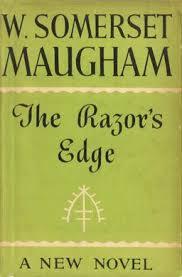
It was 1988 and I was in the process of divorcing my first wife. I lived for a time with my parents while “getting my act together.” It was at a thrift store that I picked up a copy of “The Razor’s Edge” by Somerset Maugham. When you read about a guy going through a traumatic experience and trying to work it all out at the same time it is happening to you, there is a tendency to find a connection. I was still very young and had half a mind to travel vagabond-style if not actually make my way to Nepal. I didn’t have the gumption, the intellect, or the strength. I certainly didn’t have the money. I had no other recourse but to immerse myself in several countries across a lengthy time period. I returned to the book over the next seven years or so. I’m still a searcher, in one sense, but I believe I have found a similar kind of peace to Larry Darrell.
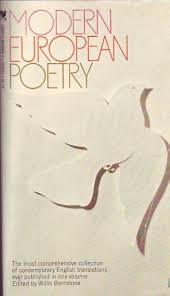
I had begun reading more poetry by the time I moved back to Boston in 1990 and quickly found myself in the burgeoning poetry scene. There was all manner of scribes from street poets, slam poets, those lyrically inclined, and a few, like myself, that delved into the Classics. I was beholden to some degree to forms: sonnets, villanelles etc. A friend had given me “Modern European Poetry” edited by Willis Barnstone. I was given to understand the significance of a viable translation when it came to foreign literature. The sections cover French, German, Greek, Italian, Russian, and Spanish. The works are largely from the first half of the 20th century and many are influenced by both world wars. It gave me new insight into poetry in a way other books hadn’t. The personal nature of the poems eventually influenced my fiction.
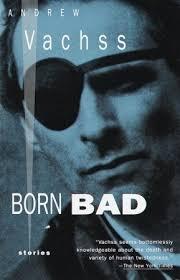
I’m not exactly sure when I picked up and read “Born Bad” by Andrew Vachss, the writer and child protection attorney. These stories were beyond hard-boiled. They were raw and gritty and often depicted evil. Not simply the gangsters with a gat or the wealthy guy in the big house manipulating everyone around him. I probably read four or five of his books in the Burke series. What I discovered was that crime fiction does not have to be black and white, good vs. evil, and all of the other finite cliches. The tropes were thrown out the window. When I started watching “Criminal Minds”, that notion was stamped into my literary mind. Hammett and Chandler are my go-to guys but the possibilities started with Vachss. Over time, I developed my own voice, but like a good sauce there are many elements within.
Books will continue to be part of my life, as resources and entertainment and inspiration. I imagine another one or two will come along that will kick me in the teeth and make an impressionable impact on me. Until that time, I will endeavor to write the books that may impact another reader.
August 7, 2024
COVER REVEAL – THE END OF THE TREACHERY
I’m pleased to present the cover for “The End of the Treachery, Volume 2 of The Wichita Chronicles.”
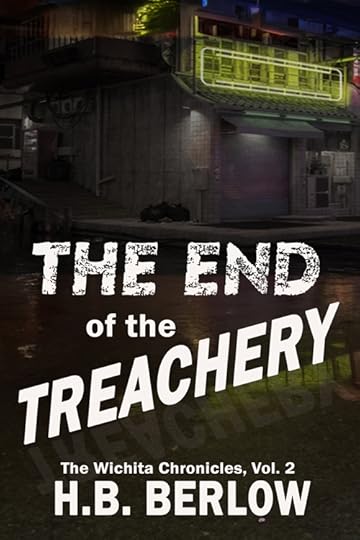
This haunting and moody design was created by Tina Lynn Stout and I couldn’t be more pleased, especially given the more sinister aspects to the story.
Harold Bergman, a Jewish private detective and World War II veteran, is approached to locate a missing girl. Little does he know, this seemingly routine case plunges him into a labyrinth of deceit, entwined with a looming threat to national security.
Meanwhile, a distraught woman challenges the official narrative surrounding her husband’s death, convinced that a vengeful client orchestrated his demise. As he delves deeper into these cases, he uncovers layers of hidden truths and personal agendas, where every step reveals a new layer of treachery.
Determined to unravel the web of lies, Harold must navigate through a maze of danger and deception, drawing upon his resilience and faith to unearth the sinister truth that threatens to unravel everything he holds dear.
The book will have its worldwide release on December 9, 2024. I’ll let you know when pre-orders will be available. In the meantime, get caught up in the first book, “The Day of Calamity.”
To find the truth, Harold Bergman will have to unmask the treachery.
July 31, 2024
COVER REVEAL AND RELEASE DATE SCHEDULE
I’ve been truly blessed to be associated with The Wild Rose Press and especially to have an exquisite working relationship with my editor, Judi Mobley. Time and effort can make you a more proficient writer; the oversight of a competent editor puts you in the next level.
I previously announced having signed the contract for Volume 2 of The Wichita Chronicles, entitled “The End of the Treachery” and now all the fun tidbits will slowly be issued forth until the actual release.
Next week, on all of the places I exist on social media, there will be the cover reveal and release date. This will be followed by excerpts, blog posts, and a few videos for entertainment and titillation. The creation of the main character, Harold Bergman, has been both deeply personal and an amazing journey. I am watching his life unfold from former policeman to World War II veteran to private detective. Witnessing him grapple with issues of morality within the confines of his Jewish upbringing, we talk with each other about our respective time periods.
So, if you have read Volume 1, “The Day of Calamity“, I hope you will continue to follow both Harold and myself on this new adventure.
TO FIND THE TRUTH, HAROLD BERGMAN WILL HAVE TO UNMASK THE TREACHERY.
July 24, 2024
EVOLUTION
When you tell someone you are a writer, the invariable first question asked is “What do you write?” This is so they can determine if your genre is of interest to them at which point they can proceed to ask for the titles and where they can be purchased. What you write, to them at that moment, is more significant than anything.
But how does a writer come to that particular genre? Perhaps a teenage kid in the mid to late 1970s, having already read Tolkein and started watching Star Wars got immersed in sci-fi or fantasy and those genres were imprinted. For most of us, the process is one of evolution. First, there is the awareness of writing. Perhaps it’s not thought of as literature. The stuff teachers make you read is literature. The stuff you want to read, well, that’s just writing.
By reading and watching television and movies, then experiencing other art forms, the field within one wishes to write emerges, as the Wizard from behind the curtain. There is then the understanding of one’s own talent and where the skill sets are best suited.
I started as a youth writing derivative short stories based on things I had read or watched from whatever fields I encountered. This continued into my teenage years. In college, my major was in creative writing and film-making. Screenwriting was a primary form. The visual sense was a requirement along with the development of story and character. Fiction became merely a tool.
It was at that time I started to dabble in poetry. Most of it was doggerel. Iambic pentameter with an ABAB rhyme scheme. Simplistic both stylistically and well as symbolically. Just find the words that rhymed and you were good. It wasn’t until I found an anthology that had an elaborate section on prosody that I became more experimental in nature. Some of my work from 1987-1994 still has some bite to it, a sense of exploration beyond the elementary. Nevertheless, I recognize the effort in most cases was greater than the results.
Crime fiction caught my attention and I focused on two neo-noir hardboiled contemporary pieces which largely taught me how to develop my instincts. Here I was approaching 50 and finally getting a handle on my own voice. Sometimes it takes a while. (After all, we are talking about EVOLUTION.)
By now, those who know me know that I have been working on historical crime fiction for the past ten years and have felt firmly ensconced within that genre. Even after six published books, I am further developing. The sense of research and how it fits within the story, almost guides it along. The development of a main character the likes of which I could not have considered twenty years ago. The themes that resonate from me to the mid-1940s. The stories themselves and what they tell us beyond a simple tale of crime and deduction.
So, if I tell you I’m a writer and you ask what I write, I WILL tell you “Historical Crime Fiction.” And IF you have the time, I can tell you so much more.
July 17, 2024
THE TRUTH OR THE STORY?
A while back I wrote a post about a writer’s proximity to a character, perhaps an almost fictionalization of biography, but identifiable nevertheless. But now we examine what happens in reverse when a writer’s supposed exploration of their lives is not all that close to the truth. After all, it was Mark Twain who said: Never let the truth get in the way of a good story.
2003 saw the publication of “A Million little Lies” by James Frey. It was marketed as a memoir of drug addiction, crime, and the return to sobriety through twelve-step programs. There were mixed reviews until it was picked as an Oprah’s Book Club selection and then spent fifteen weeks atop the New York Times Bestseller List.
And then it all came apart. Reports that much of it was fabricated came in. By early 2006 the thread was unraveling and Frey made a return appearance on Oprah’s show to admit his duplicity. Yet there are numerous questions still. Was the book praised for its writing or simply to boost sales? Had it been promoted as, say, a non-fiction novel, like “In Cold Blood”, would there have been as much pushback? Might Frey have extricated himself simply by referring to it as a meta-fiction?
If you bought the book and read it and were fascinated or moved or saddened or disgusted, the book had an impact on you. In essence, it worked. The fact that agents and publishers and, of course, Oprah herself were bamboozled led to an author being pilloried. And perhaps rightly so. But can we expect any book to contain complete truth?
One of the greatest works of the Transcendentalist movement is “Walden” by Thoreau. “I went to the woods because I wished to live deliberately, to front only the essential facts of life, and see if I could not learn what it had to teach, and not, when I came to die, discover that I had not lived.” It’s a classic opening and sets the stage for an amazing journey.
There are many who point out that Thoreau often went into town to visit family and friends, had assistance from various visitors, and wasn’t living a solitary life. Defenders claim Thoreau’s intention was to live a simple life.
Are the detractors merely looking for a reason to undermine the work because they disagree with his principles or intent? Or was Thoreau a literary fraud?
Again, if you read the book and were enchanted by the notions presented, does it really matter if the author added in components that were not verifiably true? If Thoreau wrote a novel about such a man and presented it accordingly, would there even be such a discussion?
It’s necessary, at times, to take the work in vacuo, simply read it for its merits as a piece of writing, story-telling, character development, or whatever it is you, as a reader, are looking for by choosing the work.
Whether, as we discussed previously, the fiction is so firmly part of the writer, or the writer fabricates a tale, we have too often lost sight of the reader. Just give me something entertaining that may warm my soul. I’ll figure out the truth later.
July 10, 2024
THE LIST GAME
Making lists is a fun game, a great diversion among folks with a playful and creative mind. Most of them are embedded in some kind of personal fantasy. Perhaps: 10 PEOPLE FROM HISTORY YOU WOULD LIKE TO HAVE DINNER WITH or 10 EVENTS FROM HISTORY YOU WISH YOU HAD WITNESSED. This type of game usually provides insight into the person’s mindset.
“Really? You wish you could have dinner with Dillinger?” “I can’t believe you would like to have witnessed the executions at Nuremberg!”
The other aspect is the number “10”. For the sake of a game, we create a perfect number. This is where we get our “Top 10” for everything from music to films to year-end events. My favorite from the past was 10 BOOKS TO TAKE ON A DESERTED ISLAND. But, as I get older, I’m no longer interested in the fantasy (as though anyone actually wishes to be on a deserted island).
I’ve got a new game, a new list. BOOKS TO TAKE WITH ME IF I WERE GOING SOMEWHERE THAT TECHNOLOGY IS NOT PREVALENT. The thought is that I am on sabbatical or a speaking tour or just a retreat and I want to read. There is no specified number of books but they have to be in my possession at this time.
Shall we?
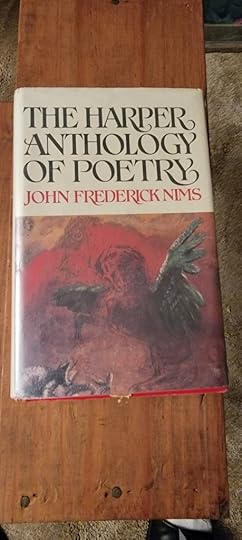
THE HARPER ANTHOLOGY OF POETRY, EDITED BY JOHN FREDERICK NIMS. Acquired while I was briefly in California in 1990. Going through a low period in my life, this book covered a wide range of styles but also included an in-depth section on prosody. My time in Boston in the early 90s was guided in part by this book. It opened my eyes to the wide-ranging world of verse from extremely olden times to the mid-20th century. It had meaning.
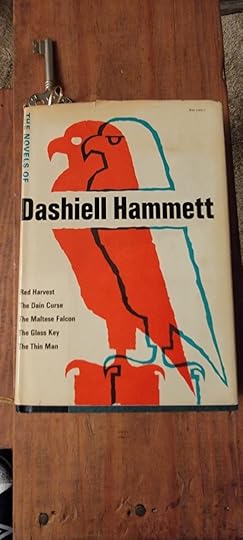
THE NOVELS OF DASHIELL HAMMETT. I’ve often stated that Hammett and Chandler are my primary influences as a writer of crime fiction. Chandler has the pretty prose and often confusing plots. Hammett, on the other hand, invented hard boiled. Crime is ugly and dirty and all too human. My own voice has taken a bit to develop. But after the four-book Ark City Confidential Chronicles and now the new Wichita Chronicles, I understand where I am.
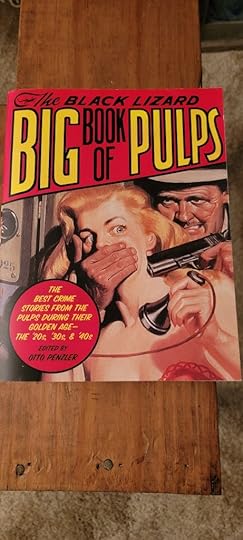
THE BLACK LIZARD BIG BOOK OF PULPS, EDITED BY OTTO PENZLER. Reading these reminds me of watching old movie serials. Short stories but those with depth and character. They reflect a time period perhaps not accurately represented in film. This book alone would get me through that imagined sabbatical. I’d probably sound like Jimmy Cagney or Edward G. Robinson by the end.
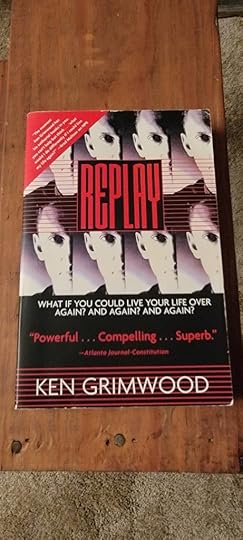
REPLAY BY KEN GRIMWOOD. I don’t read sci-fi or fantasy but this book took me by surprise. A more serious concept than “Groundhog Day”, the notion of changing timelines and the repercussions of infinitesimal changes fascinates me. It’s the big “What if…?” that every writer imagines. This in some small way triggered an interest in experimental fiction which seems to still tug at me.
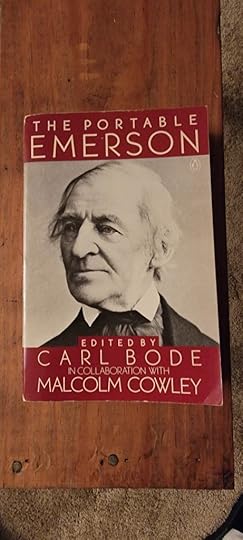
EMERSON, THE VIKING PORTABLE LIBRARY. I read him years ago because when you’re from New England, you should. Time has passed. I’ve caught snippets here and there. Time to see what he does for me as I get older. I know his words and thoughts are timeless. How they play in my now 62-year old mind would be interesting.
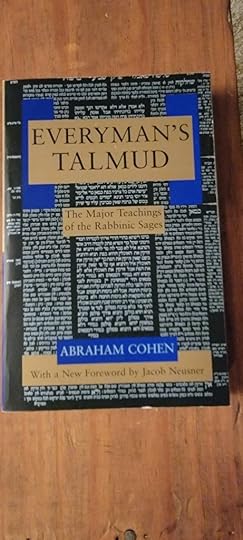
EVERYMAN’S TALMUD BY ABRAHAM COHEN. I’ve been a spiritual Jew and a poetic one but never delved into the intellectual aspect of my religion. It is not too late for me to obtain some wisdom. More even than the Old Testament, I believe there is true wisdom right here.
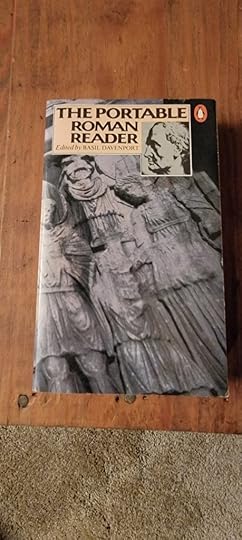
ROMAN READER, THE VIKING PORTABLE LIBRARY. This has enough variety of styles and subject matters to help bridge the cap from Biblical times to today. I’ve been more intrigued by the Romans than the Greeks. Plato and Socrates, though wise and profound, never did it for me. Horace, Catullus, and Ovid for poetry and Cicero and Seneca for rhetoric. Enough to keep a mind busy.
I’ve left out so many favorites, books and authors, non-fiction and history and art. I had to assume a small suitcase or carry case and I didn’t want the exercise to turn into an elaboration extending into the infinite.
Perhaps, had I done this years ago the list would have been different. And then years before that. If I view this list tomorrow, next week, next year, the list might be different still. Who am I kidding? It will be different. Then again, I never liked raw onions as a kid. You grow, you change.
July 3, 2024
BE BOLD. BE BRAVE.
It is my honest belief that most writers (and other creatives) write for themselves in terms of fashioning stories. Artists of all kinds become inspired by something, either internal or external, and determine to express that inspiration, that thought, that emotion. Naturally, the process of getting a finished work to the public does involve a whole slew of editors, publishers, agents, etc., but the first impetus involves the Self.
I do recall an encounter at a one-day writing workshop some fifteen to twenty years ago. I struck up a conversation with a young writer, perhaps in her early twenties, and inquired what she wrote. She declared “Steampunk” but before I had a chance to respond inquisitively, she added “It’s what’s selling now.” I nodded, smiled, and then stepped away.
This brief encounter sticks in my mind. I do not begrudge any artist who enters the field of their choice for the sole purpose of creating a product for sale. There are likely writers out there who started with grand ideas and fell into becoming a production line so that a published work with their name affixed would be available for purchase. That product has become something that is no longer a multi-course gourmet dinner but rather something purchased at the drive-through.
Yes, I work hard to write my novels. I have developed a strong relationship with an editor and am respectful of my publisher. They are unique in that they offer a commodity while at the same time foster the writer to create the best work possible and to develop their skills even further. Not all are like that.
I suppose one has the option of writing and simply storing manuscripts for future generations to discover. In that case, perhaps the act of creation is fulfilling enough. Consider Vonnegut’s proclamation about venturing forth into the artistic world:
“Go into the arts. I’m not kidding. The arts are not a way to make a living. They are a very human way of making life more bearable. Practicing an art, no matter how well or badly, is a way to make your soul grow, for heaven’s sake. Sing in the shower. Dance to the radio. Tell stories. Write a poem to a friend, even a lousy poem. Do it as well as you possibly can. You will get an enormous reward. You will have created something.”
That might be enough for some. Though I don’t try to “make a living” being a writer, however, I do want to share my stories with others if for nothing than pure entertainment. I am not the Michelin-rated chef nor am I simply a short order cook. I offer something palatable that I hope a reader will not regret spending their precious time with.
Therefore, I write within the fields I choose. Currently, I am enmeshed in historical crime fiction. I have ideas for contemporary literary fiction. I would love to dabble in poetry once again. Then, there are those offbeat experimental works that play with word usage, typography, timelines, and themes.
I will not write something simply because it’s selling now. That ship has sailed. I’ve chosen to be bold and brave with my choices. I’ve chosen to express myself.
June 26, 2024
A POEM FOR YOUR CONSIDERATION
This piece was written in 2013, for me the newest work. Unlike my “prolific” period in the early 90’s living in Boston, I turned more toward fiction in the last 15-20 years. At this point, I find poetry difficult to write. Brevity requires more precise word choices.
By one friend, I was dubbed the “Bard of Boston.” This was largely due to long hair and a goatee, along with using Shakespearean metrics to enter poetry slams. In those days, your persona was developed and you stuck with it. This limited your development.
It was in thinking back on that time period I wrote this piece, a reflection of being called upon to recite, yet again, what most folks knew of your work and requested most. I last read this piece at the OWFI Conference in 2022 at a Thursday night open mike.
DO THAT JAZZ POEM
The cigarette is burning down almost to my fingers
And I’m worried that I may not be able to tap-tap
out a proper be-bop beat,
so fast, so sweet
with a whiskey burn that comes from the street.
With sweat pouring down over the keys,
I’m unable to unlock the door to
The secret revelations.
There is the heartening cry for more, Please!,
Give us your spiritual sensations.
We want, we want, we want that
Proper be-bop beat. But I can’t give
you no more, when you’re sitting on my hands.
Your unrealistic demands plead and pour
through me like altruistic sweat.
I want to ride; I want to fly like a bird,
sacred in the sky, burnt out on the ground.
I want to go my way with pride,
Long angling stride,
And so so far away from the lost and found.
You want me to do that thing,
slender reed or plucking on an A-string.
But I don’t do for you like you don’t do for me
Because you can’t see through my eyes
And never will.
You want me to do, to do, to do
to myself what I cannot do to you.
And if I go (or if I stay)
What will you say to me? Stay or go?
No. The time is ripe for a proper be-bop beat.
Listen! Sit! Yes, have a seat and I will
tell you a different story.
Keep your eyes open and alive while I
strive to reminisce. Just a little kiss
to put you to sleep
and then I’ll slip out into the night.
Wide awake the next morning, a fright
comes into your heart. What seems
to be a vanishing act
was only just a dream.
June 19, 2024
WRITER’S BLOCK
As you can imagine from the title of this post, it is primarily intended for writers of any sort. I’m not aware of too many other professions or avocations that have something similar. Perhaps a great hitter in baseball going through a cold streak and striking out a lot. Or maybe an NBA point guard clanging the ball off the rim. But, for this discussion, we’re talking about writers.
First controversial comment: I don’t believe in writer’s block. Certainly not as it is conventionally defined. Are there times when it is difficult to write, when a scene or chapter is not coming out as expected, or at all? Will a writer get to a point in a novel where the action falls dead and the resolution is nowhere in sight? Do you sit in front of your keyboard and just don’t feel like touching the keys at all?
Sure. Absolutely. 100%. But I don’t define that as writer’s block. Those are the difficulties inherent in a creative, intellectual, and emotional process. Stories do not come flowing from one’s brain fluidly, gushing as Niagara Falls, or fully formed like Athena from the head of Zeus. We have all encountered these hurdles. While there was a time twenty years ago or so that I just didn’t feel like writing, I determined that was due to a lack of direction rather than a creative blockage.
I have never encountered a time where I was “blocked.” I’m not even certain what that means. I come up with story ideas all the time. I can’t help it. “What if” scenarios. Variations on news articles or non-fiction commentaries. A bizarre encounter with a genre or subject matter. It’s almost the same as my cooking endeavors, bread baking, and sausage making. I can do a quick bread and be satisfied. But a sourdough is going to require a starter and a longer time period. I only have the energy to make three pounds of sausages at a time. Should I choose Italian, bratwurst, or Andouille?
To those writers that feel they suffer from writer’s block, I truly empathize. But I offer this food for thought:
If your beloved grandparent, the one who was always proud of you and encouraged your art, was ill, perhaps terminally so, and you went to visit, and reaching out their hand to touch yours and said “Tell me a story!”, what are you going to do? “Sorry, Grandma, I’m suffering through writer’s block!” “Gee whiz, Grandpa, I haven’t felt like telling stories for quite a few weeks now.”
A harsh example, I know. However, I believe it shows our capacity for story-telling, on the spot, as needed. The tale you tell your beloved grandparent won’t be anything award winning, likely will require the service of an editor, and may not be well formed. But it will be a tale of wild imagination and creativity.
If there are stresses in life that hold you back from pursuing your creative endeavors, work through them to allow yourself both the strength and freedom to create. Also know the act of creation is recuperative as well.
June 12, 2024
THE WRITER AS HIS OWN CHARACTER
In “The Long Goodbye” by Raymond Chandler, one of the primary characters is Roger Wade, an alcoholic writer of trashy novels who has loftier ambitions.
In “Under the Volcano”, Malcolm Lowry’s tale details the last day in the life of an alcoholic British consul who is undergoing a spiritual crisis.
Ernest Hemingway’s “The Old Man and The Sea” tells the story of an aging fisherman’s long struggle to catch a giant marlin.
I’ve often wondered how deeply writers imbue themselves into their work. It might be a conscious effort or the result of emotional distress breaking down any barriers and allowing that particular inner self to come through clearer than any other time. Chandler, himself an alcoholic, wrote during his wife’s final illness. The despair he suffered personally comes through clearly in his most literary work. Lowry, also an alcoholic, was often drunk and out of control while living in Mexico as his first marriage was breaking up. Hemingway was also going through the breakdown of a marriage and suffered mental health issues as well as alcoholism.
These works resonate deeply. They are emotional in the sense that they exude a deep sense of humanity and resonate within the reader in a more than ephemeral way. Whatever you might read about the creation of these works, we will never be certain of the true intentions of these writers.
For my own part, the creation of Harold Bergman in The Day of Calamity, Volume 1 of The Wichita Chronicles, came about because I wanted a mouthpiece for my own moral and spiritual sensibilities. While we share the same initials and birthday, there are sufficient differences between us that no one will mistake a barely thirty-year-old war veteran with a sixty-something suburban homeowner.
Yet, I have become attuned to Harold’s dilemmas and can speak to them on a deeper level. A certain distrust of the very wealthy who seem detached from communal good. A healthy respect for his religious upbringing that doesn’t prevent questioning of the way the world is at the moment. A desire for stability in the midst of seeming impermanence. All of this, of course, incorporated into a hardboiled historical crime fiction.
I suppose extreme duress can bring out a quality in one’s writing that takes it to another level. After all, Hemingway won the Pulitzer Prize and Nobel Prize ostensibly for that work. “The Long Goodbye” is considered by some to be Chandler’s best. This does not mean writers should place themselves within a horrific set of circumstances, suffer for their art, so to speak. Rather it is interesting to come across these examples and realize the dark cloud of personal life did not impede the work.
As with other restrictions and limitations that life invariably contains, it is simply important to recognize the creative process has, to some degree, recuperative properties. Even when I am not suffering, finishing a session of writing is like coming out of a spa.



